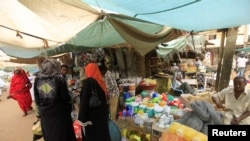A new report by World Vision highlights how flying food prices are contributing to the global hunger crisis and putting the world’s most vulnerable children at increased risk of death. It has recorded a sharp rise in food prices in some of the world’s poorest countries with Sudan registering a 143% increase since 2021.
VOA’s John Tanza spoke with World Vision Policy Advisor Hannah Chargin about Sudan’s food crisis.
The Interview was edited for brevity and clarity.
VOA: What countries or regions do you focus on in terms of food insecurity?
Chargin: We are seeing this trend globally but there is a continued hunger crisis that is continuing to mount and we're seeing this manifests most severely in countries in east Africa and in parts of Asia. And that's due really to a series of compounding factors. But really hunger is being driven by what we're calling the three Cs: conflict, climate change, and the ongoing impacts of the COVID-19 pandemic.
VOA: Looking at a country like Sudan that has had its own problems for years and is visited by conflict and COVID-19, what are some of the efforts by World Vision to mitigate that problem?
Chargin: In Sudan we have five WFP (World Food Program) partnerships, as well as a multi sectoral response program focused on livelihoods interventions, primary health care, WASH services which is clean water, sanitation services and nutrition screening and treatments in south and east Darfur and Blue Nile.
VOA: What is the magnitude of food insecurity in Sudan?
Chargin: We recently put out a report called Our Price Shocks Report and basically in addition to evaluating these drivers that I talked about before, it looks at specific countries to see how much the cost of a common food basket has increased in the past year, and in Sudan that was one of the most staggering increases with 143%. And again that's a result of the compounding factors that I described earlier. We found that it takes about nine days to earn enough money to purchase a food basket in Sudan compared to one point two hours for the same food basket in the United States. There are data points and reports that indicate that the highest cost for a local food basket in Sudan was recorded in south and east Darfur followed by the Blue Nile State.
VOA: If you look at the global response to humanitarian issues, the focus is Ukraine. Is that affecting your advocacy for countries like Sudan which have had its own problems for years before the war in Ukraine?
Chargin: Ukraine and Russia regions are a huge exporter of wheat and maize and some of these other staple crops that other countries like Sudan import. About 80 percent of Sudan's wheat imports come from that region. So, yes, the conflict is its own issue and needs attention, but the knock-on effects of that conflict have really had completely devastating consequences for countries around the world; countries like Sudan. So, yeah we do feel strongly that as an aid agency we're trying to raise awareness for these other contexts and these other countries that are being affected by the Ukraine crisis but also have their own issues and own drivers that are continuing to exasperate the hunger crisis that we're seeing.
VOA: Is there donor fatigue when it comes to issues to do with Africa and specifically Sudan?
Chargin: There is the sense that the crisis is so large, but how can we address this issue? And it really is upon aid agencies to continue to communicate that, yes the need is very great, but we have the tools and we have the understanding on how to address these issues. And we need donors, every type of donor: government donors, and individual donors to step up and to realize that they can be a part of the solution to this problem.
